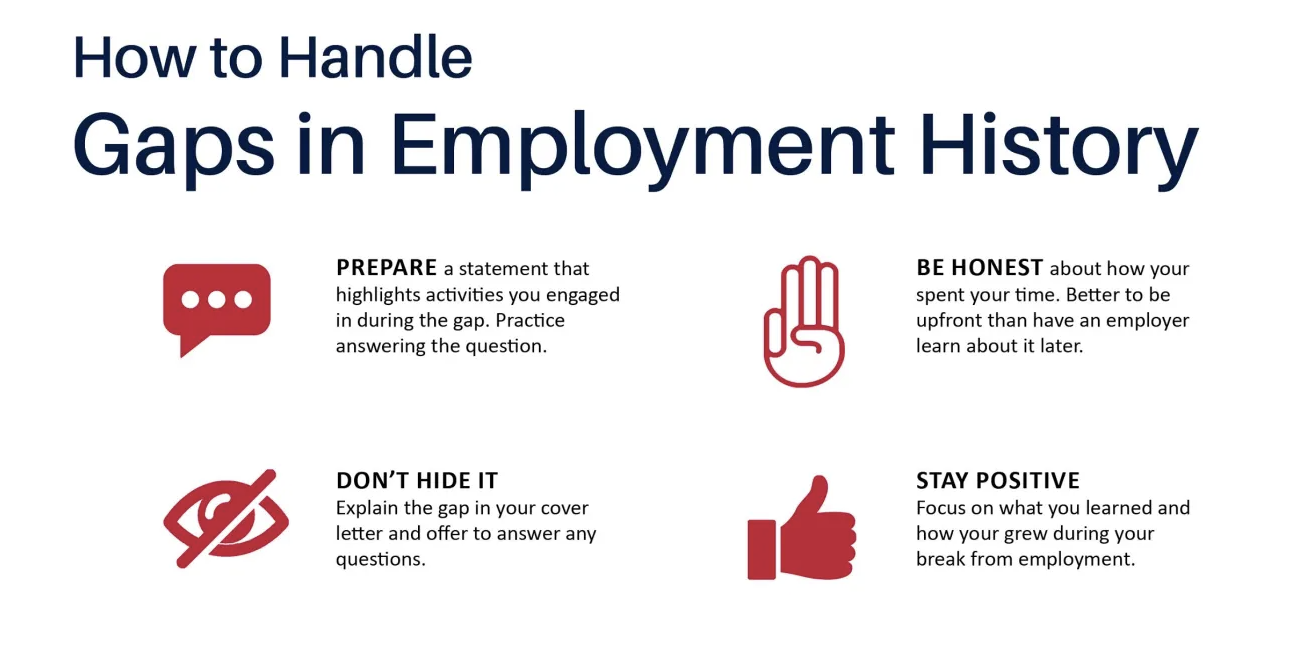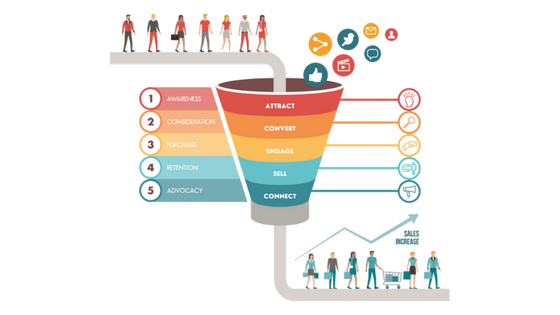In a world that is constantly evolving, it is no surprise that recruitment is changing too. Join us in this blog post as we explore how the recruitment landscape is adapting to the transformations of the job market.
In today's rapidly changing world, technology and artificial intelligence are making their mark on every industry, and recruitment is no exception. As we are heading into the last quarter of 2023, traditional approaches to hiring are undergoing a significant transformation and recruiters increasingly rely on artificial intelligence tools. The way organizations find, engage, and retain their talent is evolving, driven by contemporary trends and technological advancements.
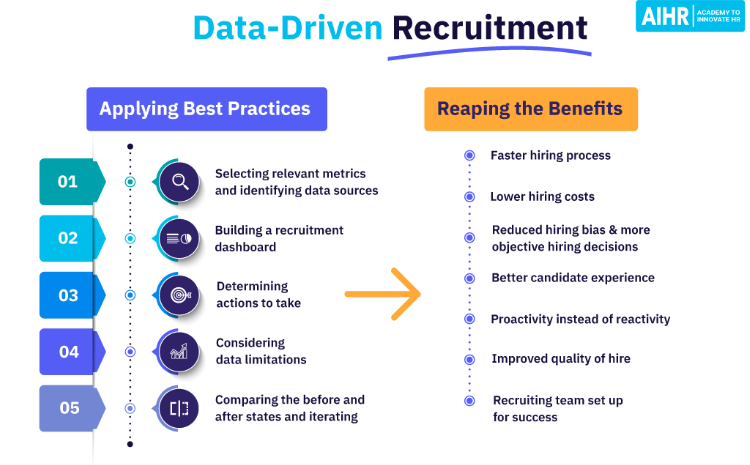
Data-Driven Recruitment: The Benefits and 5 Best Practices. Source: AIHR.
Another notable change on the horizon is the Pay Transparency Directive, a significant development that aims at bringing openness to the way salaries are disclosed within organizations.
In this blog post, we will delve into 10 prominent trends in recruitment will continue to manifest themselves throughout 2024.
10 Recruitment trends in 2024
Automation in recruitment
Using AI in recruitment comes with several benefits, such as automating tasks, improving candidate matching, and saving time and money. This technology provides valuable advantages for recruiters and HR professionals. With tools such as Chat GPT, HireVue or Avature recruiters can speed up copywriting and emailing efforts, streamline the hiring processes and evaluate the candidates’ skills and suitability for a given role.
Data-Centric Recruiting
In 2023, data-centric recruiting is a major trend reshaping how companies hire talent and many digital tools have been developed to help with recruiting efforts. They are using advanced tools like AI and big data to make smarter decisions. Metrics like 'time to hire,' 'candidates per hire,' and 'offer acceptance rate' are playing a big role. This approach helps companies hire faster, find better candidates, and improve offer acceptance rates, making hiring more efficient and in line with business goals.
Pay Transparency
Pay transparency in recruiting is rapidly gaining popularity, thanks to the recent Pay Transparency Directive passed by the European Parliament. This directive has driven the efforts for openness in employment negotiations, requiring companies to disclose salary ranges. As a result, job seekers will now have access to information about potential earnings, allowing them to make more informed decisions when considering job offers. Additionally, this shift towards greater transparency encourages employers to adopt fair and equitable compensation practices, fostering a more inclusive and equal job market.
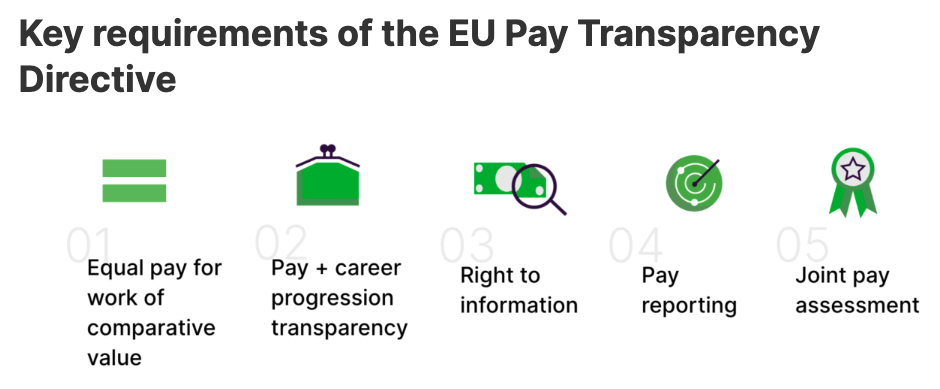
EU Pay Transparency Cheat Sheet Source: Syndio.
Continued Growth of Remote Hiring
According to the report conducted by MatcHR, 88% of employees working remotely are more satisfied with their jobs rather than having to work from the office. Moreover, 79% of employees surveyed said they would be more loyal to their employers if they offered more flexible working arrangements. This signals a noteworthy shift in the recruitment landscape, as candidates increasingly prioritize flexibility and remote work options when considering potential employers. Consequently, organizations looking to attract and retain top talent in 2023 must adapt to these evolving preferences and integrate remote work opportunities into their recruitment strategies.
Short-term hiring
In contrast to solely relying on full-time employee hires, current hiring trends reveal that companies are progressively embracing contract employment. They are turning to interim recruitment addressing the dynamic requirements of growing workforces or testing innovative approaches within the business. These professionals usually would have specific skills that are perfect for specific projects or tasks. Contract employment gives companies the flexibility to adjust to changing market needs without committing to long-term employment like they would with full-time employees.
Return to the office
Paradoxically, while remote work has gathered a growing number of enthusiasts in recent years, many companies are advocating for their employees to return to the office in the post-pandemic era. A prominent example of this shift is Zoom, which has declared its intention for employees to resume full-time office work. Additionally, Amazon and Disney are among the companies that have scaled back remote work opportunities.
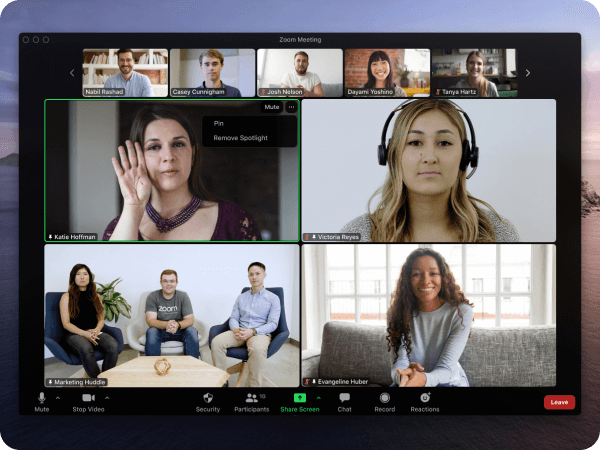
The Zoom difference: Communication without barriers. Source: Zoom.
Increased emphasis on mental health
Recruiters and HR professionals are increasingly advocating for a greater emphasis on mental health in the workplace. Recognising the impact that mental well-being has on employee productivity, engagement, and job satisfaction, they are engaging in initiatives that prioritise mental health support. This includes implementing mental health programs, destigmatising mental health discussions, and providing access to resources such as counseling and mental wellbeing tools.
Gen Z entering the workforce on a larger scale
The influx of Generation Z into the workforce is poised to be a significant recruitment trend for the year 2024 and beyond. With projections indicating that by 2025, this generation will make up roughly 30% of the workforce, employers and HR professionals are getting ready to adapt to the unique characteristics and preferences of this generation. This might involve leveraging digital recruitment platforms, emphasizing social responsibility in their corporate culture, offering opportunities for skill development, and providing flexible work arrangements.
Diversity Equity and Inclusion
Diversity, equity and inclusion are values increasingly embraced by HR professionals and implemented by numerous organizations striving to provide support for diverse groups of individuals, including those of varying races, ethnic backgrounds, religions, abilities, genders, and sexual orientations.
According to International Labour Organization, companies that foster more inclusive corporate cultures and policies experience a 59% boost in innovation and a 37% improvement in their ability to assess consumer interest and demand.
Candidate Experience
Elevating candidate experience has emerged as a prominent trend in recruitment. Employers are increasingly recognizing that providing a positive and respectful journey for job seekers, from initial contact to final decision, not only enhances their brand reputation but also attracts top talent in a competitive job market. In 2024 and beyond, companies that prioritize and invest in creating an exceptional candidate experience are poised to stand out and secure the best-fit candidates for their teams.
These trends reflect the evolving landscape of recruitment in 2023, driven by technology, data, transparency, remote work preferences, and flexible hiring approaches. Adapting to these trends can help organizations remain competitive in the evolving job market.
Prosperity
If you are seeking a job in digital or need assistance with your recruitment efforts, check out our website!
https://www.prosperity.ie/
If you want to know more about the recruitment process at Prosperity get in touch!
Moreover, if you are looking for guidance on salaries, download our 2023 Salary Survey!



